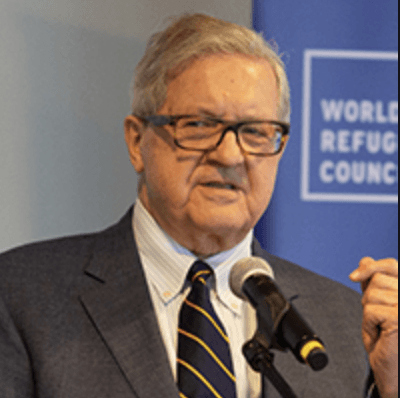Ensuring the equitable distribution of vaccines worldwide is the smart thing to do. More importantly, it is the right thing to do.
Lloyd Axworthy & Barbara Grantham
This article was first published in The Ottawa Citizen
The devastating situation in India is our newest reminder that we need global cooperation to defeat COVID-19.
Despite producing most of the world’s COVID-19 vaccines, India is facing a crushing third wave; the threat of additional variants looms. The scope of this surge is emerging as a global humanitarian crisis.
The humanitarian community has been sounding the alarm on vaccine equity for months. Humanitarian crises were on the rise before the pandemic, diverting resources from other long-term initiatives. Now the United Nations estimates that 235 million people in the world’s most fragile humanitarian settings across 56 countries are at risk of being overlooked by government-led vaccination activities.
What’s worse, feedback from refugee women reveals a deeper, more insidious problem: It’s not that they are at the back of the queue; they are not in the queue at all.
And while small numbers of vaccines may make it to fragile settings, these vaccines are useless without effective delivery systems, particularly the front-line personnel who keep us safe as they administer vaccines. More than 70 per cent of the world’s front-line health workers are women, risking their lives to get vaccines, services and supplies to the world’s most underserved and at-risk communities. Often underpaid or working in unsafe conditions, they aren’t getting access to vaccines, either. The World Health Organization estimates that 30 million people are at risk and are not included in any government vaccination plans. Many of them are community health workers. Most of them are women.
CARE estimates that for every $1 a country or donor government invests in vaccine doses, a further $5 must be invested to deliver the vaccine — to pay front-line health care workers, formal and informal, and to provide the equipment, training and compensation they need to keep themselves, their families and their communities safe. Vaccine readiness requires training of front-line health workers, the majority of whom are women. This is in line with Canada’s commitment to Feminist International Assistance and the ministerial mandate letter commitment to support and protect the rights of paid and unpaid care workers. Canada can play a leadership role in supporting the training and equip front-line health-care workers, as part of vaccine readiness efforts.
While some world leaders have made bold commitments to the equitable distribution of vaccines, high-income countries have bought nearly four times what they need. As of April 2021, low-income countries have received only 0.2 per cent of the global vaccine supply. Canada reserved more than four times the number of vaccines needed to vaccinate our own population.
Not only have high-income countries dominated vaccine demand, they have also fallen short on funding for COVAX, the global mechanism for equitable procurement and distribution of COVID-19 vaccines. COVAX stipulates free or reduced costs for low- and middle-income countries. But as of March 2021, only $8.5 billion had been committed; $11.1 billion is needed for all countries to vaccinate at least 20 per cent of their populations in 2021. Canada must ensure that our own funding commitments don’t fall short. We can also sign on to the proposal by India and South Africa, supported by nearly 100 countries, to temporarily suspend intellectual property rights so that COVID-19 vaccines are accessible for poor countries.
As with many rights and freedoms, equitable access to COVID-19 vaccines is proving to be an unrealized right, with discrimination and privilege as causal factors. Worldwide, the benefit of a few outweighs the widespread benefits for many and in particular, the health and economic wellbeing of the women and people of colour on the front lines of this crisis.
Ensuring the equitable distribution of vaccines is the smart thing to do. The longer that the virus spreads and mutates in non-vaccinated populations, the more likely we are to see the emergence of more virulent, more contagious and potentially vaccine-resistance strains. No one is safe until everyone is safe.
More importantly, it is the right thing to do.
Globally, we can save twice as many lives if vaccines are distributed equitably across nations, instead of hoarded by richer countries. Considered and equitable distribution of vaccines today will not only save lives as we face COVID-19, it will also drive the confidence and trust in global institutions needed to build a more equal future for us all.


